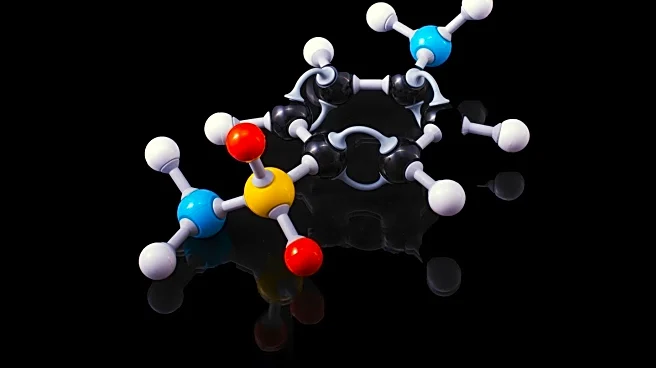What's Happening?
Recent research has identified the microbial metabolite indole-3-propionic acid (IPA) as a significant driver of mitochondrial respiration in CD4+ T cells, which plays a crucial role in protecting against
intestinal inflammation. The study, conducted under strict ethical guidelines, explored the impact of IPA on cellular metabolism, particularly its ability to modulate energy pathways such as glycolysis and the tricarboxylic acid cycle. The findings suggest that IPA can inhibit the differentiation of naive CD4+ T cells into pro-inflammatory TH1 and TH17 cells, even during secondary antigenic challenges. This discovery points to IPA's potential in modulating immune responses and maintaining intestinal health, offering insights into new therapeutic strategies for inflammatory bowel diseases (IBD).
Why It's Important?
The implications of this research are significant for the field of immunology and the treatment of inflammatory diseases. By enhancing mitochondrial respiration, IPA supports the energy needs of T cells, which are essential for effective immune responses. This could lead to novel treatments for conditions like Crohn's disease and ulcerative colitis, where immune regulation is disrupted. The ability of IPA to prevent the differentiation of T cells into inflammatory types suggests a potential for reducing chronic inflammation, a common issue in many autoimmune diseases. This research could pave the way for new dietary or microbial interventions aimed at increasing IPA levels in the body, thereby improving immune function and intestinal health.
What's Next?
Future research will likely focus on understanding the precise mechanisms by which IPA influences T cell metabolism and its long-term effects on immune function. Clinical trials may be initiated to evaluate the efficacy of IPA-based treatments in patients with IBD and other inflammatory conditions. Additionally, there may be an exploration of dietary or probiotic approaches to enhance IPA production in the gut microbiome. Researchers will also need to investigate the safety and optimal dosing of IPA to ensure its therapeutic potential can be realized without adverse effects.
Beyond the Headlines
The study highlights the broader implications of gut microbiota in regulating immune responses and maintaining health. It underscores the importance of microbial metabolites in influencing host physiology, suggesting that the gut microbiome could be a target for therapeutic interventions. This research also raises questions about the role of diet and lifestyle in modulating microbial metabolite levels and their impact on health. As the understanding of the gut-immune axis deepens, it may lead to a paradigm shift in how inflammatory and autoimmune diseases are treated, focusing more on microbiome health and its metabolic outputs.










